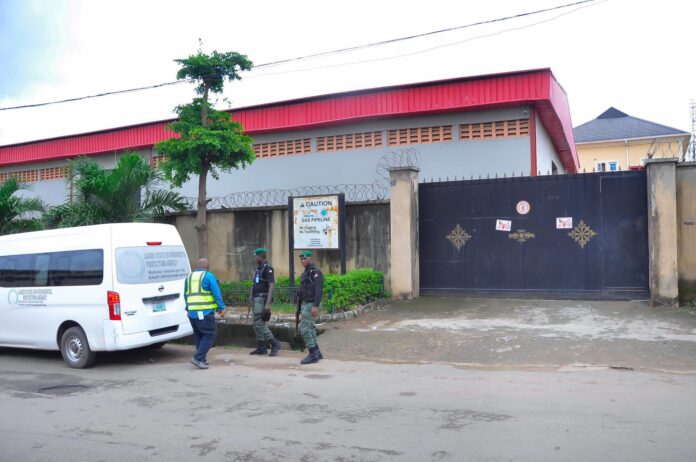The Lagos State government intensified its battle against noise pollution in 2024, shutting down 528 establishments, including religious centres and businesses, for violating environmental noise regulations. The action underscores the administration’s determination to improve living conditions in the bustling metropolis.
The revelation came from Dr. Babatunde Ajayi, General Manager of the Lagos Environmental Protection Agency (LASEPA), during a briefing about the agency’s achievements in 2024 and its plans for 2025. Dr. Ajayi emphasized that the agency’s overarching goal was to ensure a cleaner, healthier, and more livable Lagos.
Tackling Noise Pollution: A Year in Review
Noise pollution, often described as an invisible disruptor, has long plagued Lagos residents, with complaints ranging from blaring loudspeakers at religious events to excessive industrial and vehicular noise. According to Dr. Ajayi, 2024 marked a year of substantial progress. “In all our activities, we strive to make Lagos a better place for residents and visitors,” he stated, adding that the agency has committed itself to strict enforcement and awareness campaigns.
Among the 528 establishments shut down last year, religious centres formed a significant portion. This move attracted attention because of the central role churches and mosques play in the community. However, Dr. Ajayi was unyielding in his stance, noting that “compliance with environmental regulations is non-negotiable, irrespective of an organization’s societal significance.”
Enhanced Advocacy and Digitalisation for Greater Impact
As the agency moves forward, 2025 promises to bring a mix of innovation and stringent enforcement. Dr. Ajayi outlined plans to double efforts in public advocacy, focusing on ingraining environmental consciousness in residents’ daily lives. “We hope 2025 will be better than last year. We aim to engrain in the hearts of Lagosians the importance of environmental awareness,” he remarked.
To streamline its operations and improve responsiveness, LASEPA has invested in the digitalisation of many of its processes. The agency has upgraded its public complaint system, enabling Lagosians to report environmental violations more efficiently. “We have digitalised lots of our processes and doubled down on our public complaint centre so that people can reach us easily,” Dr. Ajayi said, emphasizing the importance of maintaining open communication lines with the public.
Focus on Industry Compliance
Industries in Lagos are not exempt from the agency’s intensified scrutiny. According to Dr. Ajayi, LASEPA will hold industries to higher standards this year. “We will be holding industries more responsible in 2025,” he noted, adding that these entities must ensure compliance with regulations designed to mitigate noise pollution and other environmental issues.
Past incidents highlight the challenges of enforcing environmental laws in Lagos. Businesses often flout regulations, while some argue for more leniency citing economic pressures. Nonetheless, experts agree that unchecked noise pollution has severe implications for public health, including stress, hearing loss, and reduced productivity.
The Rising Impact of LASEPA’s Advocacy
LASEPA’s recent actions have won praise from environmentalists and some residents but drawn criticism from groups claiming that the shutdowns unfairly target specific sectors, such as religious institutions. Advocacy groups supporting environmental regulation have called the measures long overdue, citing the negative health impact of constant exposure to high noise levels.
Commenting on LASEPA’s approach, an environmental activist, Mrs. Yetunde Ogunsanya, applauded the initiative but urged the agency to offer a more collaborative framework for offenders to remediate their practices. “Shutting down operations is effective but can be complemented by robust engagement to educate violators,” she said.
Global Context of Noise Regulation
Lagos’s initiative mirrors global trends where urban centres adopt stringent measures to curb noise pollution. Cities like New York, London, and Delhi enforce noise ordinances to protect residents’ well-being. In some cities, heavy fines accompany violations, while others have implemented curfews on industrial and entertainment activities to maintain quiet hours.
Nigeria’s rising urban population, especially in Lagos, adds urgency to this challenge. Over 20 million residents in the economic capital contend with high-decibel environments daily. Environmental analysts believe addressing this issue will significantly improve Lagos’s quality of life.
The Road Ahead
Looking ahead, LASEPA has ambitious goals. Beyond combating noise, the agency aims to expand its reach to other critical environmental concerns. Dr. Ajayi hinted at plans for more robust partnerships with local stakeholders and international organizations to enhance sustainability initiatives.
“The journey towards an environmentally conscious Lagos requires collective effort. Residents, businesses, and government agencies must collaborate to achieve meaningful results,” he concluded.

